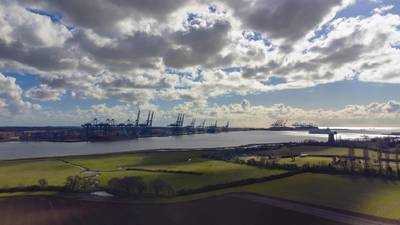What Impact Will Strike at Britain's Busiest Container Port Have?
More than 1,900 workers at Britain's biggest container port, Felixstowe, have begun eight days of strike action that will cause disruption to trade and supply chains.
The staff at Felixstowe, on the east coast of England, are taking industrial action in a dispute over pay, becoming the latest workers to strike in Britain as unions demand higher wages for members facing a cost-of-living crisis. read more
Below is a look at Felixstowe's operations and the possible impact from the strike:
How big is the port?
About 48% of all containers brought into the UK are transported through the Felixstowe port, according to the Unite union, making it an important import hub for Britain.
Britain's biggest and busiest container port, and also one of Europe's largest, Felixstowe handles more than 4 million 'Twenty-foot Equivalent Units' (TEUs) of goods and 2,000 ships arriving each year, according to its website.
Its container handling capacity is forecast to double to 8 million TEUs by 2030.
What goods pass through Felixstowe?
Felixstowe imported 37.4 billion pounds ($44.2 billion) worth of goods last year, according to the Observatory of Economic Complexity (OEC) online data platform.
In 2021, its top imports included toys, data processing machines, and wooden and metal furniture, according to OEC data. During May this year, the main imports were furniture, computers and automotive parts.
At 9.12 billion pounds ($10.8 billion), the port's exports amounted only to about a quarter of its imports, OEC data showed. Exports during May this year included pharmaceutical products, scrap aluminum and copper.
In May, China was both the top origin and destination country for most goods transported through Felixstowe.
Where do imported goods go from the port?
About 70% of containers transported through Felixstowe are delivered, via road and rail links, to a region in the middle of Britain known in the logistics trade as the "golden triangle".
The triangle, which is within a four-hour drive of 90% of the British population, is home to the national distribution centers of many of Britain's high street brands and retailers including Tesco, Asda and Marks and Spencer.
What trade could be affected by the strike?
The strike could disrupt more than $800 million in trade including in clothing and electronic components, causing trade to be diverted to smaller UK ports as well as international ports including Wilhelmshaven in Germany, risk management firm Russell Group said.
The disruption spells more uncertainty for businesses, consumers and governments and could exacerbate shipping congestion and backlogs caused by the coronavirus pandemic, Suki Basi, Russell Group MD, said.
What impact can consumers expect?
Paul Davey, the head of corporate affairs at Hutchison Ports, the Hong Kong-based operator of Felixstowe, said that while local haulage firms would lose money from the strike, consumers around the country would not see a big impact.
"Most of the containers... are coming from the Far East. They are on long supply chains," he told ITV on Monday. "It will be an impact but not massive."
A spokesperson for Sainsbury's said the retailer was monitoring the situation closely and had contingency plans in place to ensure products were available.
Retailers will try to reroute freight through other container ports or use alternative transport to ensure products remain available, said Andrew Opie, director of food and sustainability at the British Retail Consortium.
"Fresh food will be unaffected as most of it goes through the roll-on roll off-port at Dover," Opie said.
($1 = 0.8466 pounds)
(Reuters - Reporting by Sachin Ravikumar and Yadarisa Shabong; Editing by Gareth Jones)














